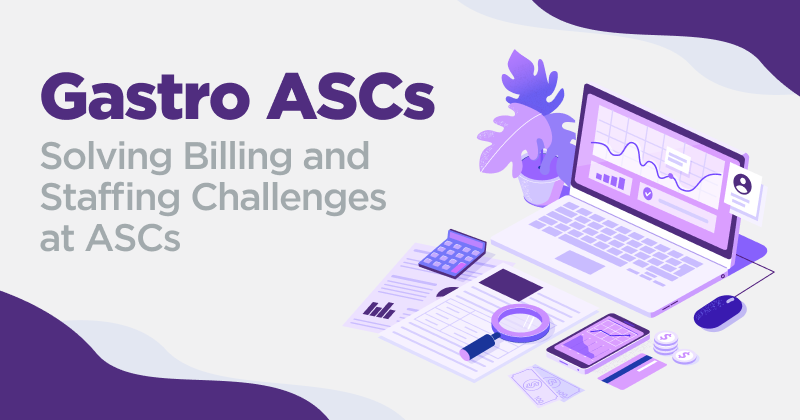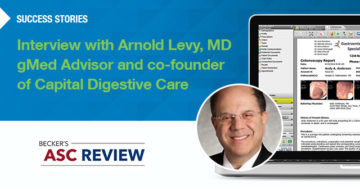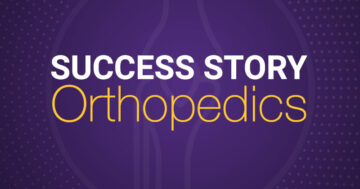Gastroenterology ASCs: Solving Billing and Staffing Challenges at Surgery Centers

With gGastro for ASCs, it’s easier to manage billing, while creating a supportive environment for patients and staff.
Gastroenterology ASCs are facing new challenges. As healthcare evolves, surgery center profitability is becoming an issue, demanding greater agility from physicians to overcome rising costs and survive complex payer frameworks. For many centers, staffing levels are limited, making it even more difficult to deliver high-quality patient care. All of this is occuring during a time when patient expectations have increased with the rise of common technologies, like text messaging and online reviews.
Here, ModMed helps you explore some of the challenges your gastroenterology ASC may be up against. We’ll share a few solutions that may give your surgery center a competitive advantage as the healthcare industry continues to grow and change.
ASC Operational Costs Are Rising
Solution: Limit and fix part of your overhead with a centralized EHR.
For many gastroenterology ASCs, increases in operational costs are surpassing any increases in 2023 proposed payment rates for GI procedures.
The American Gastroenterological Association reports that a slight increase to the proposed conversion factor could bring it up by 2.7% to $51.315 for ASCs that meet quality reporting requirements. For hospitals, a proposed 2.7% increase translates to $86.785.
That’s because the Centers for Medicare & Medicaid Services (CMS) account for ambulatory surgery center inflation differently than it does for hospitals:
- Hospital inflation is measured against the cost of medical expenses
- ASC inflation is measured against the Consumer Price Index –Urban (CPI-U)
The CPI-U measures the cost of consumer goods — things like personal groceries and utilities — not medical expenses. The CPI-U inflation update is historically lower than hospital inflation.
This means ASCs may have overhead for gastroenterology surgeries that is similar to hospital overhead for the same procedures, but hospital reimbursements may more closely mirror actual expenses.
One way to reduce the financial impact of this disparity is to streamline operations and records with centralized software that limits costly manual effort and scales consistently across your surgery centers:
- ModMed’s gGastro® includes specialty-specific diagnoses, orders, maps, findings, billing codes, forms and patient medical history questionnaires right out of the box.
- gGastro ASC is designed specifically for gastroenterology ambulatory surgery centers. It integrates nursing notes straight into the doctor’s final note, eliminating duplicate data entry. With a cloud option, you can skip server maintenance, too.
This means if you have gGastro and gGastro ASC, your data from gGastro can pull directly and automatically from EHR into gGastro ASC. You can also extend access to your smartphone, so you can view schedules, patient data and more from multiple devices.
“The all-in-one gastroenterology software has helped streamline our ASC operations and save time. The intuitive system adapts to my workflow, so I can document a procedure note in three minutes or less. I’m literally done with the report as the patient is leaving the room,” shares Samuel Gun, DO, FACOI of Tri-County Gastroenterology, PC.
Book a demo to learn more about how gGastro for ASCs can help your ASC offset rising operational costs.
Reimbursements Can Present Obstacles
Solution: Streamline Reporting for gGastro for ASCs.
Gastroenterology ASCs may be dealing with greater challenges securing reimbursements as healthcare shifts toward value-based care and other financial models.
Combined with rising operational costs, the scenario can feel dire, but ModMed can help your ASC stay on top of reporting.
gGastro ERW captures detailed data to support ASC Quality Reporting (ASCQR), Outpatient and Ambulatory Surgery CAHPS (OAS CAHPS) Survey and GIQuIC reporting by collecting and electronically gathering data for quality indicators for EGDs and colonoscopy procedures.
Solution: Get advanced billing and coding analytics with gInsights™.
gInsights, our analytics platform, lets you review your clinical, financial and operational data, using comprehensive reports, quick filters, field selection and tabular or data visualization formats. With just a few clicks, you can drill down to view location, provider and patient details and track quality improvement initiatives over selected time periods.
Reports allow you to monitor your ASC’s financial performance and expectations:
- Payment Variance: Find differences between what your ASC was paid and what it should have been paid, based on your fee schedule. You can see the exact breakdowns within a formula of (Payment Allowed + Patient Responsible) – Fee Schedule Allowed = Payment Variance.
- Allowable Reporting: See what your ASC can expect to be paid based on what’s currently in your accounts receivable (AR).
- Appointments Missing Charges: Show completed appointments that don’t have an associated charge created. Customize tags within views to quickly identify areas of potential missed revenue.
- Unposted and Unbilled Posted Charges: Unposted Charges shows preliminary bills that haven’t been posted in the system yet. Unbilled Posted Charges focuses on charges that have been posted, but not successfully sent to payers. This report helps you find revenue that may fall through the cracks without action.
These reporting and analytics features make it easier for everyone to track growth, discover opportunities and plug financial leaks at your ASC.
Gastroenterology Patients Shop for Prices
Solution: Offer patients price transparency with gEstimator™.
Your patients may appreciate transparency, too. While it’s true that hospitals may be paid more for performing the same gastroenterology surgeries you perform at your ASC, there’s usually a few benefits to patients who choose an ASC. For some, the atmosphere can be more palatable than a hospital, but, for many, the cost may be lower.
Give your patients an out-of-pocket cost estimation with gEstimator, an online solution that you can access during visits or from within practice management queues.
gEstimator is available to clients who use our gGastro EHR and our endowriter with gPM™, ModMed’s gastroenterology practice management software, and to standalone ASCs with gPM.
Your gEstimator quote is a way to assess costs and includes information from various sources:
- The patient’s insurance plan
- Previous patient balances
- Procedure codes and modifiers
- Where surgery will be performed
- Which providers are involved
- Scheduled date of service
- Other factors that may impact price
As patients become savvier about their healthcare expenses, they can come to expect this level of transparency. The level of price detail and accuracy can be a tipping point in your patients’ decision-making, especially as insurance deductibles climb or online reviews clue them into provider value.
Staffing Resources May Be Constrained
Solution: Streamline administrative workflows.
When your staff is struggling to complete everyday tasks and focus on patient care, it can help to introduce faster, easier workflow experiences:
- Eliminate unnecessary clicks, taps and scrolling with software that hones in on the options you need.
- Manage patient recalls, including appointments, orders and recall letters, in one place.
- Connect various healthcare providers and gastroenterology industry registries in one place.
- Rely on automations that reuse data to help minimize reentry and suggest ICD-10, CPT and modifier codes for review and acceptance by the provider.
By making administrative tasks easier for your staff, they can do more with each shift, reducing the risk of burnout and allowing them more energy to focus on your patients.
Solution: Automate patient engagement.
On the patient side of the equation, staff constraints can be a dealbreaker. If your patients aren’t receiving the attention they deserve, they may find another surgery center. Same goes for if they have a hard time scheduling appointments, can’t get through to staff for record requests or believe that you just don’t care about their experience.
Your staff may lament these risks to patient satisfaction, but when they’re constantly tied up performing tasks, it can be hard to change the situation.
This is where patient engagement tools can be helpful. Online portals and apps, automated scheduling reminders, and easier prescription management can reduce barriers to care and improve overall patient engagement.
These tools may also help relieve overburdened staff, so that they may be able to give patients more attention when they do call or come in.
Solution: Build culture to reduce attrition.
While automation and centralized workflows can do a lot to support your staff’s well being on the job, it’s usually culture that keeps them at your ASC for the long haul. Show your staff they matter at your gastroenterology ASC by developing a company culture that suits the size of your surgery center:
- Share growth plans and explain how you’re handling challenges in meetings.
- Develop and encourage career paths so any provider can advance at work.
- Compensate senior staff at current, competitive market rates, so they don’t have to job hop to keep pace with inflation.
- Engage junior staff in additional aspects of patient care to build inspiration.
- Form resource groups for staff to discuss culture and surface new ideas.
When your surgery center can provide staff with the support they need to feel valued at work and maintain a healthier work-life balance, you’re less likely to suffer attrition. Essentially, culture solves the human problems that come with frantic work days. For the rest of your ASC’s challenges, technology can help build consistency, efficiency and cost savings.
Ready to get a handle on billing challenges at your ASC? See how gGastro can help.
This blog is intended for informational purposes only and does not constitute legal or medical advice. Please consult with your legal counsel and other qualified advisors to ensure compliance with applicable laws, regulations and standards.







